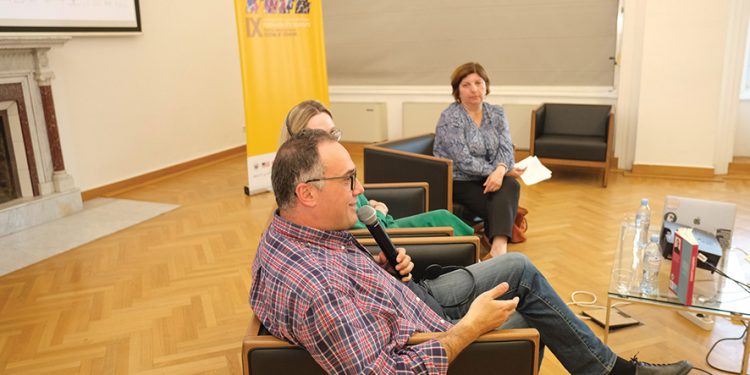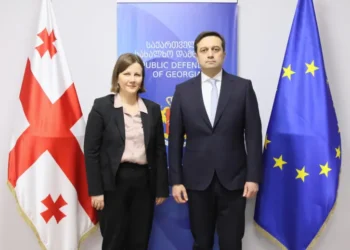Writers have always played a historical role in Georgia, according to the Executive Director of PEN Georgia Natasha Lomouri, and even today, literature can expose parallels within society.
The 9th edition of Tbilisi’s International Festival of Literature (TIFL) took place from September 27-30. The festival’s theme was ‘Protests within literature and beyond,’ which Lomouri, the co-founder of the event, found suiting, considering Georgia’s current political situation. She tells GEORGIA TODAY that she often seeks a theme that directly relates to Georgia and the world around it.
In the spring and summer of 2024, numerous protests broke out in Georgia in response to the then newly passed ‘Foreign Agents’ law. According to Lomouri, many people who were at the forefront of those protests were writers and other creatives. She sees writers as people who can take events or information and phrase them so they further touch their audience.
“Literature can not only expose some of the faults and problems in society, but it can also serve as a facilitator of something new and hopeful,” Lomouri says. “I always wonder if the writers of today can only afford to be storytellers. In most cases now, they are also mediums of a connection between people and events and what’s happening around us.”
Lomouri explains that writers were important historically within the country because they could influence public opinion; that writers were part of the founding fathers of Georgia, and people would examine how they told their stories, especially in the late 19th and early 20th centuries. For her, she says, it is vital that writers within the country continue this narrative.
Author Lasha Bugadze, a presenter during TIFL, talked about his book ‘Georgia Against Joseph Stalin’. Written in conjunction with SovLab, a think tank that deconstructs Georgia’s Soviet totalitarian past, the book focuses on Stalin, personally and politically, and his role in annexing Georgia – which Bugadze coined a ‘tragic and catastrophic history of Georgia’.
He tells GEORGIA TODAY that his book is based on historical documents that aim to break down the myths surrounding Stalin. Additionally, he notes that there are discreet ‘Stalinistic’ narratives and doctrines in place within the Georgian Dream party. Bugadze says, “The more books we read, the less chance manipulators will have to brainwash us, since we will know the history.”
Stalin, who claimed himself to be religious, a good leader, and a person synonymous with strength, are myths that Bugadze says Russia is using as a hybrid war instrument. During his discussion at TIFL, which highlighted the repression and political situation during Stalin’s regime, he noted that he believes Putin is using Stalin as a form of propaganda to bring together countries that have a common Soviet past, and says that this leads to emotional reactions within countries, especially in Georgia, exactly because people are not knowledgeable about the historical facts.
Lomouri agrees. “I read recently that Stalin was a Georgian citizen but not a Georgian,” she says. “Ethnically he was, but he gave so much sorrow to Georgia. He tried to wipe out the whole intellect of the nation, and his repressions, especially in the 1930s were unbearable. It’s important that a reader sees the many similarities between this regime now and the Bolshevik regime back then. We need to tell the truth about Stalin, who was Georgian.”
Traditionally, TIFL has always been held at the Writer’s House, a place for literary development and processes in Georgia. However, Lomouri says she was director of the residence for 12 years before her term was halted simply due to ‘different political views,’ so she moved to PEN Georgia, where she became the executive director and continued the festival. It was the first year the festival was organized under the PEN umbrella, and it took place at multiple locations, including the Georgian Museum of Fine Arts, the Goethe Institute in Tbilisi, and The Movement Theater (See page 10 for more).
According to Lomouri, “More than 100 writers, publishers, and translators are boycotting the Writer’s House and the Ministry of Culture. Half of the magic of this festival was that it was always held in the Writer’s House and its beautiful surroundings.”
PEN Georgia is a non-governmental organization with chapters worldwide. It was first created in 1921 after World War 1 and fights to defend freedom of expression. Georgia’s branch has been operating since 1991. Lomouri claims that if Georgian Dream stays in power, the PEN Center will be shut down, and it will become increasingly harder to have any artistic practices. She is unsure if there will be resources for the tenth-year anniversary of TIFL, but she says, “If we survive, I promise we will have a great festival.”
BY SHELBI R. ANKIEWICZ














